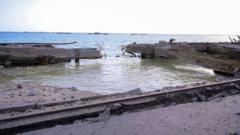Israel's military has commenced new ground operations in southern Lebanon, asserting the need to dismantle Hezbollah's military infrastructure. This move escalates tensions amid a fragile cease-fire established in November, amidst accusations of Hezbollah's disarmament violation. U.S. envoy Thomas Barrack Jr. met with Lebanon's government recently, citing the cease-fire's ineffectiveness due to ongoing Israeli strikes.
Israel Resumes Ground Operations in Southern Lebanon Amid Fragile Truce

Israel Resumes Ground Operations in Southern Lebanon Amid Fragile Truce
Despite a cease-fire agreement with Hezbollah, Israel has launched ground incursions in southern Lebanon, heightening tensions and raising fears of renewed conflict.
Israel's military recently announced its first ground operations in months, launching incursions into southern Lebanon with the stated goal of dismantling military infrastructure belonging to Hezbollah. The Israeli government’s announcement comes in the context of increased tension surrounding the truce established in November, which ended one of the deadliest conflicts between these two adversaries in many years.
The cease-fire agreement included expectations that Israel would withdraw from southern Lebanon, which it had invaded during the previous hostilities. However, Israel maintains control over five positions along the border, alleging that Hezbollah has violated the crux of the agreement by maintaining an armed presence in the region.
Since the cease-fire was enacted, Israel has conducted near-daily airstrikes aimed at Hezbollah targets, with an intensification observed in recent weeks. While Hezbollah has yet to respond militarily to Israeli strikes, the escalating military actions have raised alarms about the potential for renewed conflict. According to the Lebanese health ministry, about 250 individuals have reportedly lost their lives due to these attacks since the truce, a figure that does not differentiate between combatants and civilians.
The Israeli military confirmed that their recent operations included locating and destroying weapons depots and firing positions, sharing footage of nighttime actions within Lebanese territory. In response, Hezbollah claims to have withdrawn its fighters from the south, with the Lebanese government dismantling numerous military installations within the area. However, the complete disarmament of Hezbollah remains a contentious issue, with fears looming over a resumption of full-scale hostilities.
Naim Qassem, Hezbollah's leader, reiterated in a recent speech that their fighters would not disarm as long as Israeli attacks continue to occur amidst the cease-fire. Concurrently, Israel has executed targeted strikes on other threats, including a high-profile Hamas official near Tripoli, reflecting the complexities of the region’s security landscape.
The announcement of these renewed Israeli operations coincided with the visit of a U.S. envoy, Thomas J. Barrack Jr., who arrived in Beirut to discuss a U.S. roadmap for Hezbollah's disarmament. After engaging with Lebanese President Joseph Aoun, Barrack expressed satisfaction regarding Lebanon's reaction to the U.S. proposal, though he did not disclose specific details about the content of the communication. Despite the diplomatic efforts, Barrack characterized the cease-fire as a “total failure,” citing Israel’s ongoing military operations and violations by Hezbollah as critical factors undermining the agreement.






















